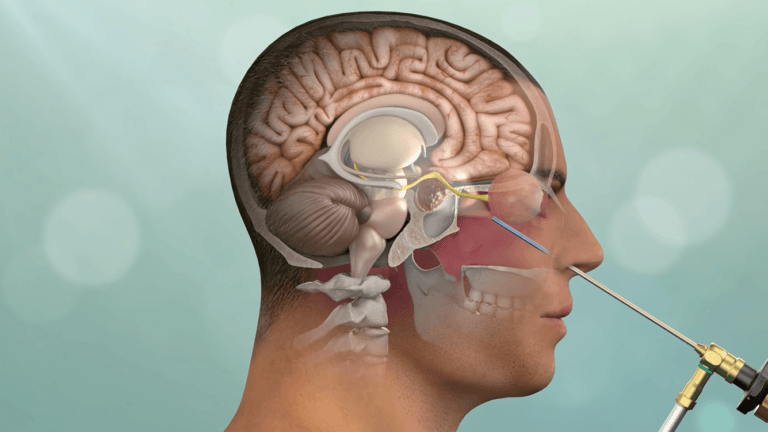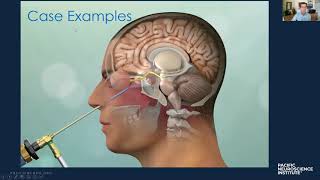
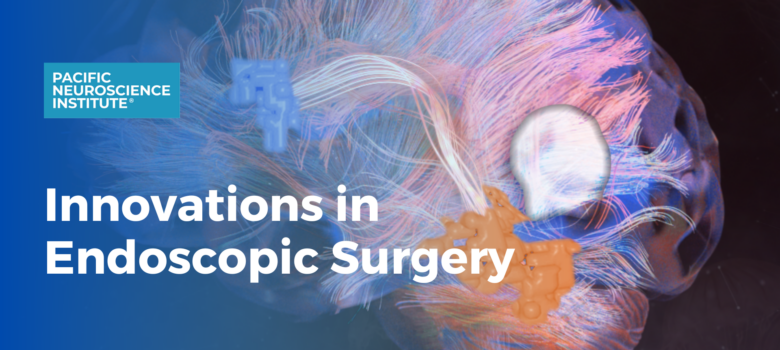
Innovations in Endoscopic Surgery for Pituitary Tumors
by PNI Experts
Named among the nation’s top neurology and neurosurgery centers, experts at Pacific Neuroscience Institute® (PNI) are at the forefront of research in the advancement of treatment and follow-up care. We sat down with Daniel F. Kelly, MD, Director and Co-Founder of PNI and a multiple recipient of the Southern California Super Doctors Distinction, to discuss innovations in pituitary tumor neurosurgery and pituitary gland disorders treatment.
The impact of innovations in neurosurgery and at PNI
Innovations in neurosurgery have not only improved patient outcomes but drastically changed the surgical field. In the past 15 years alone, we have seen a shift from metastatic melanoma being the most common malignant brain tumor, to now being one of the least common due to targeted therapies and immunotherapies.
Today, with the help of endoscopic surgery, neurosurgeons can perform microsurgeries better than ever before, particularly those involved with the pituitary gland.
The Pacific Pituitary Disorders Center at Pacific Neuroscience Institute® is on the leading edge of pituitary gland tumor and pituitary disorders treatment. We have longstanding expertise in endoscopic endonasal surgery, pituitary tumor care, and related endocrine, ENT (ear, nose & throat) and neuro-ophthalmologic (eye & vision) services.
Disorders due to tumors on the pituitary gland can be difficult to diagnose and hormone analysis can be a challenge. We are excited to highlight our endocrine testing unit which is important in the accurate diagnosis of pituitary disorders.
What is the pituitary gland?
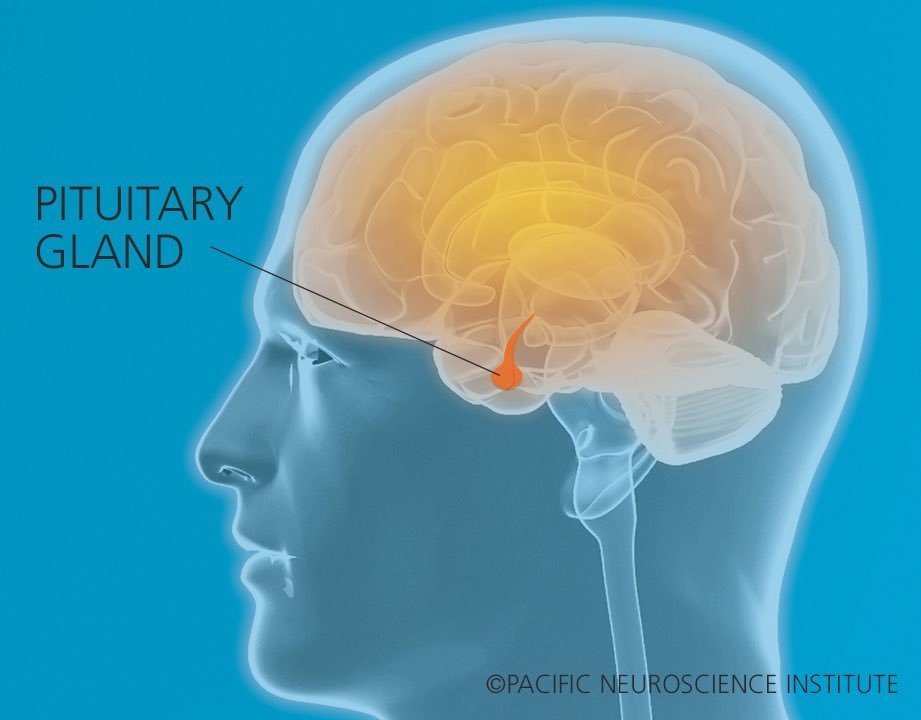
The pituitary gland, or master gland, controls all of the body’s hormonal functions. It is very small and is surrounded by a unique set of structures, including the carotid arteries, optic nerves, and the nearby brainstem. It’s a very compact, amazing area, and unfortunately, a lot of tumors arise there. For our patients, fortunately, these tumors are very removable and mostly benign (non-cancerous).
What is the most common type of pituitary tumor?
Although there are rare types of pituitary tumors, such as craniopharyngiomas and chordomas of the skull base, over 80% of pituitary tumors are pituitary adenomas. Because the pituitary gland is responsible for producing hormones that regulate various bodily functions, including growth, metabolism, reproduction, and stress response, tumors on the pituitary gland cause a disruption in the normal hormone balance. Pituitary adenomas are removed through the nose by endoscopic endonasal surgery. For these patients, most are in the hospital for one night and go home the next day.
Can pituitary tumors be treated with medication?
Prolactinomas are the only subset of pituitary tumors that are treated through medication. Using a drug called dopamine agonist, prolactinomas typically shrink through medication and do not require surgery.
However, pituitary medicine is a multidisciplinary team endeavor and has come a long way. At PNI, we have a Center of Excellence team approach that allows a patient with a pituitary tumor to consult with an endocrinologist regarding their hormones, a neuro-opthalmologist for their vision, and a neurosurgeon to remove the tumor, often all in one day. This multidisciplinary care under one roof and collaboration is ideal for our patients.
How are pituitary tumors diagnosed?
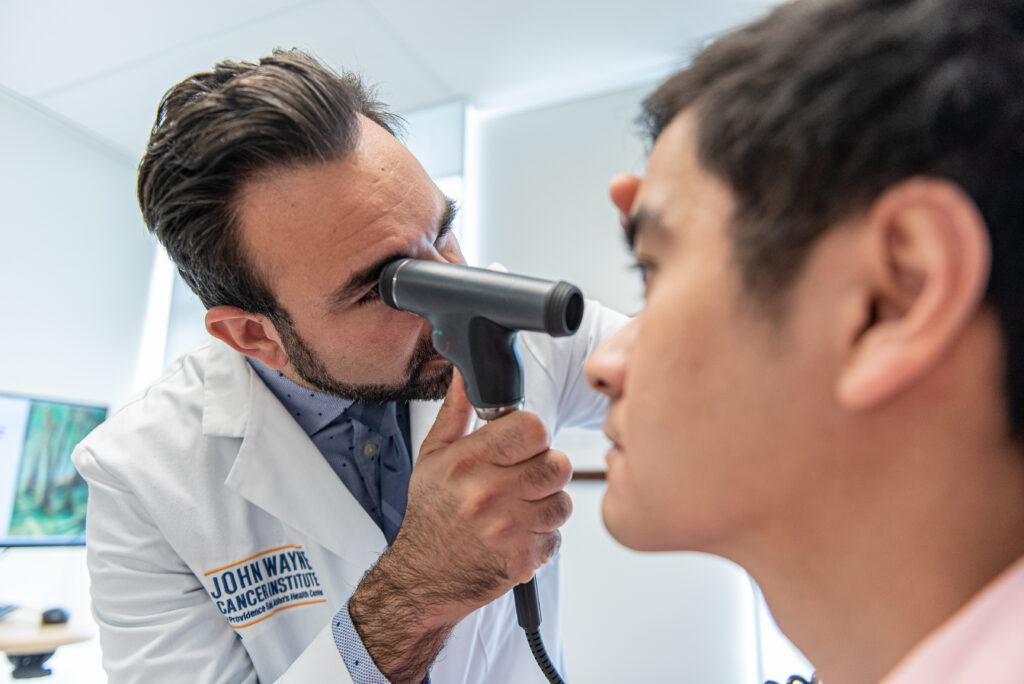
Many patients with a pituitary tumor are referred by an ophthalmologist, primary care doctor, or endocrinologist. If they come in with a functional tumor, such as Cushing’s disease, which happens when there is too much cortisol in the blood, or acromegaly, which happens when there is too much growth hormone, the first thing that we do is make sure that the diagnosis is correct.
Depending on the size and location, the patient may be recommended as a candidate for endoscopic endonasal surgery. In preparation for the surgery, the patient is briefed on the procedure and all relevant aspects of pre- and post-operative care.
How are pituitary tumors discovered and detected?
Pituitary tumors frequently go unnoticed or undiagnosed. This is often due to the fact that the symptoms produced by hormone-secreting tumors, known as functioning adenomas, and larger tumors, referred to as macroadenomas, closely mimic those of other medical conditions. Additionally, these tumors typically grow very slowly over time. Smaller pituitary tumors that do not secrete hormones, termed nonfunctioning microadenomas, often remain asymptomatic. So, most pituitary tumors are discovered incidentally by an unrelated MRI or CT scan that reveals the tumor.
How is pituitary surgery performed?
We employ an endonasal approach. Pituitary surgery is performed using a thin tube with a camera and light source called an endoscope. The angled lens of the endoscope goes inside the nasal cavity to the sphenoid sinus, allowing surgeons to see a panoramic view of the brain rather than the tunnel vision of the microscope.
What is the recovery time from endoscopic surgery?
Endoscopic surgery allows surgeons to remove a tumor without retraction of the brain (moving the brain structures away from the tumor), getting patients through surgery more easily and with minimal collateral damage. At PNI, we have the shortest length of stay within all 51 Providence hospitals, with patients recovering from brain tumor surgery within one or two days.

When should you suspect a pituitary tumor?
Symptoms may include low blood pressure, low blood sugar, fatigue, fertility issues, and decreased libido. Pituitary tumors typically develop spontaneously, with no known cause. If you suspect that you have a pituitary tumor, you should see a health care provider who can order tests to diagnose it. These tests may include:
- Blood and urine tests to check hormone levels and overall health
- MRI scan which uses radio waves and magnets to create detailed images of the brain
- CT scan which is a special type of x-ray that takes detailed pictures of the brain
Contact us for more information
Santa Monica: 310-582-7450
Torrance: 424-212-5361
Burbank: 818-847-6049
Useful links
Pituitary disorders specialist team at PNI
Articles related to pituitary disorders
Videos related to pituitary disorders
About the Author
PNI Experts
Last updated: November 6th, 2024


















